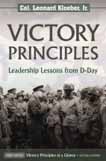Seven Bedrock Leadership Principles Used by all Successful Leaders
There are seven bedrock leadership principles that all leaders use. These are principles and not prescriptions. Hence, leaders must tailor the application of the principles to their unique organization and in their own way. Despite their unique application, these principles are the underpinnings of all successful leadership endeavors. Here are the common treads of successful leadership:
1. Vision: All great leaders have an inspiring vision of the future which provides direction and hope for a better day. They are effective at communicating and building support for their vision to get everyone in their organization on board. Effective leaders usually enlist the support of key followers to help craft their vision. This builds trust and confidence, and also leverages the unique talents and perspectives of others within the organization.
2. Innovation and Learning: Leaders are always looking for better ways to accomplish their objectives and they encourage people to experiment with new approaches and learn from them. Sometimes the innovations don’t work out as planned, but good leaders will encourage their people to quickly learn from the experience and move on to try another approach. When they find an approach that works, they quickly move to exploit their success. They avoid placing blame for failure and share the glory for success with the team.
3. Capabilities – People and Resources: All great leaders are looking for people with the right skills to have on their team; they also know that even the best people must have the right resources to be successful. Leaders take it upon themselves to obtain the right people and the right resources for their team. They are the lead talent scouts and take on the responsibility to find whatever is needed to get the job done.
4. Timely Decisions: Leaders make timely decisions so their organization can move forward. Furthermore they have a disciplined approach to decision making that often involves the use of a decision making model. They know that they will not always make the right decision, but by having a disciplined approach to decision making that they can increase their odds of success. They also periodically review their decisions and make appropriate course corrections to move towards their goals.
5. Operating Principles and Values: Great leaders know that the best way to influence their organization is through the use of operating principles and values. Operating Principles and Values establish a framework for behavior within the organization and allow people to act in concert with the positive cultural norms. This is how leaders empower others in the organization to take action when needed without resorting to command and control style leadership by giving orders from the top.
6. Resilience: Leaders know that the path to success is not a straight line. There are always obstacles along the way that must be overcome. The skill of overcoming obstacles and pushing through resistance is called resilience. Leaders themselves must be resilient to overcome setbacks, and they must instill this quality in their people and the organization as a whole. The best way to do this is by example. In times of crisis, people will look to the leader to see how they behave. If the leader maintains their cool under fire, and pushes ahead, others will follow. This is the principle of resilience in action.
7. Your Team: Leaders put their team first. They make sure that every team member knows what is expected of them; that they are trained to do their job; and that they are taken care of as individuals. Leaders who take good care of their people know that the people will take care of them when the chips are down because they have earned their trust. Great leaders “lead from the front.” They go where the action is to be with their team so that they have a deep understanding of what the real issues are that their people are dealing with on a daily basis. This creates trust, provides critical information for the leader upon which they can base their decisions, and demonstrates genuine concern for the people and the organization.
Applying these principles will not guarantee your success; however, if you fail to use them, you will not be an effective leader. All great leaders use these principles, but also use their own leadership style to implement them. If you observe great leaders in action, you will find them using these principles to lead their organizations to success.
This article wass recently published in www.ezinearticles.com and can be viewed at the following link:
http://ezinearticles.com/?Seven-Bedrock-Leadership-Principles-That-All-Great-Leaders-Use&id=2400285


